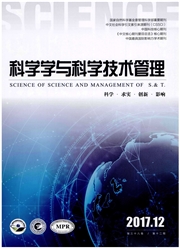

 中文摘要:
中文摘要:
政府R&D补贴对研发产出的影响没有一个确定的结论。现实中,超过50%的R&D支出是科学家和工程师的薪酬,所以,政府补贴如何影响科技人员薪酬及其激励效果就是理解政府补贴影响研发产出的核心内容:利用1998—2008年我国高技术产业的数据,进行了实证研究。,结果发现,政府R&D补贴对国有企业科技人员的工资水平有更显著的正向影响;在国有企业中,政府R&D补贴对专利-薪酬敏感性有显著的正向影响,三资企业的政府R&D补贴对新品销售收入-薪酬敏感性有显著的正向影响。结果表明,高技术产业的目标和承担的责任不同,决定了它们所采取的激励策略和激励效果也不同。
 英文摘要:
英文摘要:
There is no a certain conclusion about the impact of government R&D subsidies on output of R&D. In practice 50% or more of R&D spending is the wages and salaries of highly educated scientists and engineers Hence, how government's R&D subsidies affect the compensation and its incentive effect is the core of understand- ing how government's R&D subsidies affect output of R&D. Using the data on China's high-tech industry, the era- pirical results indicate that, relative to non state-owned enterprises(NSOES), government's R&D subsidies has more significant positive relationship with the compensation of technology employees in state-owned enterprises(SOES) In SOES, government's R&D subsidies make patent be more sensitive to compensations and government's R&D subsidies make new product sales be more sensitive to compensations in NSOES. These findings show that high-tech industry has different objective and different duty to use different compensations and makes different in- centive effects. This paper deepens the research on the effect of government's R&D subsidies on output and helps researchers understand the relationship among government subsidies, ownership and economic purpose deeply
 同期刊论文项目
同期刊论文项目
 同项目期刊论文
同项目期刊论文
 The Effect of Differentiated Margin on Futures Market Investors’ Behavior and Structure: An Experime
The Effect of Differentiated Margin on Futures Market Investors’ Behavior and Structure: An Experime Multiple Large Shareholders Structure and Good Governance: The Roles of Shareholder Numbers, Control
Multiple Large Shareholders Structure and Good Governance: The Roles of Shareholder Numbers, Control Political Connections and Capital Allocation Efficiency of Chinese Listed Companies through Bond Fin
Political Connections and Capital Allocation Efficiency of Chinese Listed Companies through Bond Fin The private benefits of control in Chinese listed firms: Do cash flow rights always reduce sharehold
The private benefits of control in Chinese listed firms: Do cash flow rights always reduce sharehold Technology Spillovers of Foreign Direct Investment in Coastal Regions of East China: A Perspective o
Technology Spillovers of Foreign Direct Investment in Coastal Regions of East China: A Perspective o Political Connections and the Efficiency of Capital Allocation Through Bond Financing in Chinese Lis
Political Connections and the Efficiency of Capital Allocation Through Bond Financing in Chinese Lis The impacts ofinstitutional and individual investors on the price discovery in stock indexfutures ma
The impacts ofinstitutional and individual investors on the price discovery in stock indexfutures ma Group social capital andlending outcomes in the financial credit market: An empirical study of onlin
Group social capital andlending outcomes in the financial credit market: An empirical study of onlin Political Connections andthe efficiency of capital allocation through bond financing in Chinese list
Political Connections andthe efficiency of capital allocation through bond financing in Chinese list Does Underwriter ReputationPromote Fair Pricing Behavior In The IPO Process?–Evidence From ChiNext-L
Does Underwriter ReputationPromote Fair Pricing Behavior In The IPO Process?–Evidence From ChiNext-L 期刊信息
期刊信息
